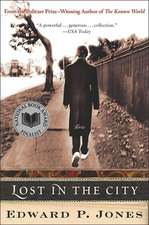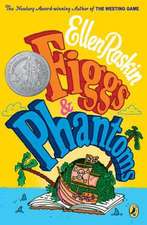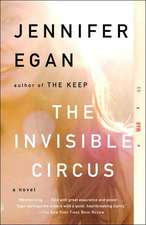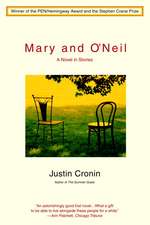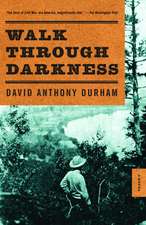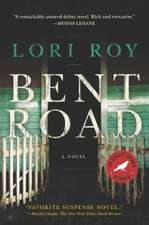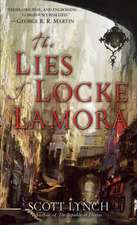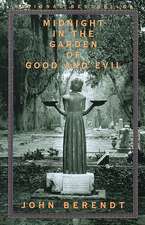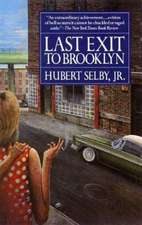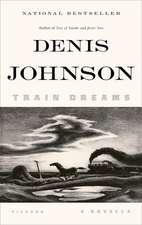Eventide: Vintage Contemporaries
Autor Kent Harufen Limba Engleză Paperback – 30 apr 2005 – vârsta de la 14 până la 18 ani
Vezi toate premiile Carte premiată
Colorado Book Award (2005)
| Toate formatele și edițiile | Preț | Express |
|---|---|---|
| Paperback (2) | 43.72 lei 22-36 zile | +35.58 lei 5-11 zile |
| Pan Macmillan – 11 apr 2013 | 43.72 lei 22-36 zile | +35.58 lei 5-11 zile |
| VINTAGE CONTEMPORARIES – 30 apr 2005 | 96.11 lei 22-36 zile |
Din seria Vintage Contemporaries
-
 Preț: 109.95 lei
Preț: 109.95 lei -
 Preț: 101.80 lei
Preț: 101.80 lei -
 Preț: 96.52 lei
Preț: 96.52 lei -
 Preț: 107.46 lei
Preț: 107.46 lei -
 Preț: 91.77 lei
Preț: 91.77 lei -
 Preț: 100.35 lei
Preț: 100.35 lei -
 Preț: 111.51 lei
Preț: 111.51 lei -
 Preț: 96.11 lei
Preț: 96.11 lei -
 Preț: 96.93 lei
Preț: 96.93 lei -
 Preț: 97.34 lei
Preț: 97.34 lei -
 Preț: 111.92 lei
Preț: 111.92 lei -
 Preț: 117.87 lei
Preț: 117.87 lei -
 Preț: 95.92 lei
Preț: 95.92 lei -
 Preț: 113.56 lei
Preț: 113.56 lei -
 Preț: 101.88 lei
Preț: 101.88 lei -
 Preț: 108.09 lei
Preț: 108.09 lei -
 Preț: 115.42 lei
Preț: 115.42 lei -
 Preț: 106.04 lei
Preț: 106.04 lei -
 Preț: 99.75 lei
Preț: 99.75 lei -
 Preț: 90.64 lei
Preț: 90.64 lei -
 Preț: 87.84 lei
Preț: 87.84 lei -
 Preț: 99.60 lei
Preț: 99.60 lei -
 Preț: 105.41 lei
Preț: 105.41 lei -
 Preț: 99.30 lei
Preț: 99.30 lei -
 Preț: 120.26 lei
Preț: 120.26 lei -
 Preț: 103.74 lei
Preț: 103.74 lei -
 Preț: 100.98 lei
Preț: 100.98 lei -
 Preț: 100.76 lei
Preț: 100.76 lei -
 Preț: 89.09 lei
Preț: 89.09 lei -
 Preț: 115.94 lei
Preț: 115.94 lei -
 Preț: 101.34 lei
Preț: 101.34 lei -
 Preț: 125.13 lei
Preț: 125.13 lei -
 Preț: 89.50 lei
Preț: 89.50 lei -
 Preț: 132.88 lei
Preț: 132.88 lei -
 Preț: 93.85 lei
Preț: 93.85 lei -
 Preț: 89.91 lei
Preț: 89.91 lei -
 Preț: 106.45 lei
Preț: 106.45 lei -
 Preț: 119.87 lei
Preț: 119.87 lei -
 Preț: 107.92 lei
Preț: 107.92 lei -
 Preț: 77.02 lei
Preț: 77.02 lei -
 Preț: 125.21 lei
Preț: 125.21 lei -
 Preț: 105.82 lei
Preț: 105.82 lei -
 Preț: 112.11 lei
Preț: 112.11 lei -
 Preț: 83.94 lei
Preț: 83.94 lei -
 Preț: 96.93 lei
Preț: 96.93 lei -
 Preț: 97.15 lei
Preț: 97.15 lei -
 Preț: 88.62 lei
Preț: 88.62 lei -
 Preț: 111.76 lei
Preț: 111.76 lei -
 Preț: 129.78 lei
Preț: 129.78 lei -
 Preț: 100.57 lei
Preț: 100.57 lei
Preț: 96.11 lei
Nou
Puncte Express: 144
Preț estimativ în valută:
18.40€ • 19.99$ • 15.46£
18.40€ • 19.99$ • 15.46£
Carte disponibilă
Livrare economică 31 martie-14 aprilie
Preluare comenzi: 021 569.72.76
Specificații
ISBN-13: 9780375725760
ISBN-10: 0375725768
Pagini: 300
Dimensiuni: 133 x 206 x 18 mm
Greutate: 0.24 kg
Editura: VINTAGE CONTEMPORARIES
Seria Vintage Contemporaries
Locul publicării:New York, NY
ISBN-10: 0375725768
Pagini: 300
Dimensiuni: 133 x 206 x 18 mm
Greutate: 0.24 kg
Editura: VINTAGE CONTEMPORARIES
Seria Vintage Contemporaries
Locul publicării:New York, NY
Notă biografică
KENT HARUF is the author of five previous novels (and, with the photographer Peter Brown, West of Last Chance). His honors include a Whiting Foundation Writers’ Award, the Mountains & Plains Booksellers Award, the Wallace Stegner Award, and a special citation from the PEN/Hemingway Foundation; he was also a finalist for the National Book Award, the Los Angeles Times Book Prize, and the New Yorker Book Award. He died in November 2014, at the age of seventy-one.
Extras
They came up from the horse barn in the slanted light of early morning. The McPheron brothers, Harold and Raymond. Old men approaching an old house at the end of summer. They came on across the gravel drive past the pickup and the car parked at the hogwire fencing and came one after the other through the wire gate. At the porch they scraped their boots on the saw blade sunken in the dirt, the ground packed and shiny around it from long use and mixed with barnlot manure, and walked up the plank steps onto the screened porch and entered the kitchen where the nineteen-year-old girl Victoria Roubideaux sat at the pinewood table feeding oatmeal to her little daughter.
In the kitchen they removed their hats and hung them on pegs set into a board next to the door and began at once to wash up at the sink. Their faces were red and weather-blasted below their white foreheads, the coarse hair on their round heads grown iron-gray and as stiff as the roached mane of a horse. When they finished at the sink they each in turn used the kitchen towel to dry off, but when they began to dish up their plates at the stove the girl made them sit down.
There's no use in you waiting on us, Raymond said.
I want to, she said. I'll be gone tomorrow.
She rose with the child on her hip and brought two coffee cups and two bowls of oatmeal and a plate of buttered toast to the table and then sat down again.
Harold sat eyeing the oatmeal. You think she might of at least give us steak and eggs this once, he said. On account of the occasion. But no sir, it's still only warm mush. Which tastes about like the back page of a wet newspaper. Delivered yesterday.
You can eat what you want after I'm gone. I know you will anyway.
Yes ma'am, probably so. Then he looked at her. But I'm not in any rush for you to leave here. I'm just trying to joke you a little.
I know you are. She smiled at him. Her teeth were very white in her brown face, and her black hair was thick and shiny and cut off neat below her shoulders. I'm almost ready, she said. First I want to feed Katie and get her dressed, then we can start.
Let me have her, Raymond said. Is she done eating?
No, she isn't, the girl said. She might eat something for you though. She just turns her head away for me.
Raymond stood and walked around the table and took up the little girl and returned to his seat and sat her on his lap and sprinkled sugar on the oatmeal in his bowl and poured out milk from the jar on the table and began to eat, the black-haired round-cheeked girl watching him as if she were fascinated by what he was doing. He held her easily, comfortably, his arm about her, and spooned up a small portion and blew over it and offered it to her. She took it. He ate more himself. Then he blew over another spoonful and gave that to her. Harold poured milk into a glass and she leaned forward over the table and drank a long time, using both hands, until she had to stop for breath.
What am I going to do in Fort Collins when she won't eat? Victoria said.
You can call on us, Harold said. We'll come see about this little girl in about two minutes. Won't we, Katie.
The child looked across the table at him, unblinking. Her eyes were as black as her mother's, like buttons or currants. She said nothing but took up Raymond's calloused hand and moved it toward the cereal bowl. When he held out the spoon she pushed his hand toward his mouth. Oh, he said. All right. He blew over it elaborately, puffing his cheeks, moving his red face back and forth, and now she would eat again.
When they were finished Victoria carried her daughter into the bathroom off the dining room to wash her face and then took her back to their bedroom and changed her clothes. The McPheron brothers went upstairs to their rooms and got into town clothes, dark trousers and pale shirts with pearl snaps and their good white hand-shaped Bailey hats. Back downstairs they carried Victoria's suitcases out to the car and set them in the trunk. The backseat was already loaded with boxes of the little girl's clothes and blankets and bedsheets and toys, and a child's padded car seat. Behind the car was the pickup and in its bed, together with the spare tire and the jack and a half dozen empty oil cans and dry wisps of brome hay and a piece of rusted barbed wire, were the little girl's high chair and her daybed, its mattress wrapped in a new tarp, all of it lashed down with orange binder twine.
They returned to the house and came out with Victoria and the little girl. On the porch Victoria paused for a moment, her dark eyes welling with sudden tears.
What's the matter here? Harold said. Is something wrong?
She shook her head.
You know you can always come back. We're expecting you to. We're counting on it. Maybe it'll help to keep that in mind.
It isn't that, she said.
Is it because you're kind of scared? Raymond said.
It's just that I'm going to miss you, she said. I haven't been gone before, not like this. That other time with Dwayne I can't even remember and I don't want to. She shifted the little girl from one arm to the other and wiped at her eyes. I'm just going to miss you, that's all it is.
You can call if you need something, Harold said. We'll still be here at the other end.
But I'm still going to miss you.
Yes, Raymond said. He looked out from the porch toward the barnlot and the brown pastures beyond. The blue sandhills in the far distance low on the low horizon, the sky so clear and empty, the air so dry. We're going to miss you too, he said. We'll be about like old played-out workhorses once you're gone. Standing around lonesome, always looking over the fence. He turned to study her face. A face familiar and dear to him now, the three of them and the baby living in the same open country, in the same old weathered house. But you think you can come on? he said. We probably ought to get this thing started if we're going to.
Raymond drove her car with Victoria sitting beside him so she could reach into the back and tend to Katie in her padded chair. Harold followed them in the pickup, out the lane onto the gravel county road, headed west to the two-lane blacktop, then north toward Holt. The country both sides of the highway was flat and treeless, the ground sandy, the wheat stubble in the flat fields still bright and shiny since its cutting in July. Beyond the barrow ditches the irrigated corn stood up eight feet tall, darkly green and heavy. The grain elevators in the distance showed tall and white in town beside the railroad tracks. It was a bright warm day with the wind coming hot out of the south.
In Holt they turned onto US 34 and stopped at the Gas and Go where Main Street intersected the highway. The McPherons got out and stood at the pumps, gassing up both vehicles as Victoria went in to buy them cups of coffee and a Coke for herself and a bottle of juice for the little girl. Ahead of her in line at the cash register a heavy black-haired man and his wife were standing with a young girl and a small boy. She had seen them walking at all hours along the streets of Holt and she had heard the stories. She thought that if it weren't for the McPheron brothers she might be like them herself. She watched as the girl moved to the front of the store and took a magazine from the rack at the plateglass windows and flipped through it with her back turned away as if she were not related in any manner to the people at the counter. But after the man had paid for a box of cheese crackers and four cans of pop with food stamps, she put the magazine back and followed the rest of her family out the door.
When Victoria came out, the man and the woman were standing in the tarred parking lot deciding something between themselves. She couldn't see the girl or her brother, then turned and saw they were standing together at the corner under the traffic light, looking up Main Street toward the middle of town, and she went on to where Raymond and Harold were waiting for her at the car.
It was shortly after noon when they drove down the ramp off the interstate and into the outskirts of Fort Collins. To the west, the foothills rose up in a ragged blue line obscured by yellow smog blown up from the south, blown up from Denver. On one of the hills a white A was formed of whitewashed rocks, a carryover from when the university's teams were called the Aggies. They drove up Prospect Road and turned onto College Avenue, the campus was all on the left side with its brick buildings, the old gymnasium, the smooth greens lawns, and passed along the street under the cottonwoods and tall blue spruce until they turned onto Mulberry and then turned again and then located the apartment building set back from the street where the girl and her daughter would now live.
They parked the car and the pickup in the lot behind the building, and Victoria went in with the little girl to find the apartment manager. The manager turned out to be a college girl not unlike herself, only older, a senior in sweatshirt and jeans with her blonde hair sprayed up terrifically on her head. She came out into the hallway to introduce herself and began at once to explain that she was majoring in elementary education and working as a student teacher this semester in a little town east of Fort Collins, talking without pause while she led Victoria to the second-floor apartment. She unlocked the door and handed over the key and another one for the outside door, then stopped abruptly and looked at Katie. Can I hold her?
I don't think so, Victoria said. She won't go to everybody.
The McPherons brought up the suitcases and the boxes from the car and set them in the small bedroom. They looked around and went back for the daybed and high chair.
Standing in the door, the manager looked over at Victoria. Are they your grandfathers or something?
No.
Who are they? Your uncles?
No.
What about her daddy then? Is he coming too?
Victoria looked at her. Do you always ask so many questions?
I'm just trying to make friends. I wouldn't pry or be rude.
We're not related that way, Victoria said. They saved me two years ago when I needed help so badly. That's why they're here.
They're preachers, you mean.
No. They're not preachers. But they did save me. I don't know what I would've done without them. And nobody better say a word against them.
I've been saved too, the girl said. I praise Jesus every day of my life.
That's not what I meant, Victoria said. I wasn't talking about that at all.
The McPheron brothers stayed with Victoria Roubideaux and the little girl throughout the afternoon and helped arrange their belongings in the rooms, then in the evening took them out to supper. Afterward they came back to the rented apartment. When they were parked in the lot behind the building they stood out on the pavement in the cool night air to say good-bye. The girl was crying a little again now. She stood up on her toes and kissed each of the old men on his weathered cheek and hugged them and thanked them for all they had done for her and her daughter, and they each in turn put their arms around her and patted her awkwardly on the back. They kissed the little girl. Then they stood back uncomfortably and could not think how to look at her or the child any longer, nor how to do much else except leave.
You make sure to call us, Raymond said.
I'll call every week.
That'll be good, Harold said. We'll want to hear your news.
Then they drove home in the pickup. Heading east away from the mountains and the city, out onto the silent high plains spread out flat and dark under the bright myriad indifferent stars. It was late when they pulled into the drive and stopped in front of the house. They had scarcely spoken in two hours. The yardlight on the pole beside the garage had come on in their absence, casting dark purple shadows past the garage and the outbuildings and past the three stunted elm trees standing inside the hogfencing that surrounded the gray clapboard house.
In the kitchen Raymond poured milk into a pan on the stove and heated it and got down a box of crackers from the cupboard. They sat at the table under the overhead light and drank down the warm milk without a word. It was silent in the house. There was not even the sound of wind outside for them to hear.
I guess I might just as well go up to bed, Harold said. I'm not doing any good down here. He walked out of the kitchen and entered the bathroom and then came back. I guess you've decided to sit out here all night.
I'll be up after a while, Raymond said.
Well, Harold said. All right then. He looked around. At the kitchen walls and the old enameled stove and through the door into the dining room where the yardlight fell in through the curtainless windows onto the walnut table. It feels empty already, don't it.
Empty as hell, Raymond said.
I wonder what she's doing now. I wonder if she's all right.
I hope she's sleeping. I hope her and that little girl are both sleeping. That'd be the best thing.
Yes, it would. Harold bent and peered out the kitchen window into the darkness north of the house, then stood erect. Well, I'm going up, he said. I can't think what else I'm suppose to do.
I'll be up shortly. I want to sit here a while.
Don't fall asleep down here. You'll be sorry for it tomorrow.
I know. I won't. Go ahead on. I won't be long.
Harold started out of the room but stopped at the door and turned back once more. You reckon it's warm enough in that apartment of hers? I been trying to think. I can't recollect a thing about the temperature in them rooms she rented.
It seemed like it was warm enough to me. When we was in there it did. If it wasn't I guess we'd of noticed it.
You think it was too warm?
I don't guess so. I reckon we'd of noticed that too. If it was.
I'm going to bed. It's just goddamn quiet around here is all I got to say.
I'll be up after a bit, Raymond said.
From the Hardcover edition.
In the kitchen they removed their hats and hung them on pegs set into a board next to the door and began at once to wash up at the sink. Their faces were red and weather-blasted below their white foreheads, the coarse hair on their round heads grown iron-gray and as stiff as the roached mane of a horse. When they finished at the sink they each in turn used the kitchen towel to dry off, but when they began to dish up their plates at the stove the girl made them sit down.
There's no use in you waiting on us, Raymond said.
I want to, she said. I'll be gone tomorrow.
She rose with the child on her hip and brought two coffee cups and two bowls of oatmeal and a plate of buttered toast to the table and then sat down again.
Harold sat eyeing the oatmeal. You think she might of at least give us steak and eggs this once, he said. On account of the occasion. But no sir, it's still only warm mush. Which tastes about like the back page of a wet newspaper. Delivered yesterday.
You can eat what you want after I'm gone. I know you will anyway.
Yes ma'am, probably so. Then he looked at her. But I'm not in any rush for you to leave here. I'm just trying to joke you a little.
I know you are. She smiled at him. Her teeth were very white in her brown face, and her black hair was thick and shiny and cut off neat below her shoulders. I'm almost ready, she said. First I want to feed Katie and get her dressed, then we can start.
Let me have her, Raymond said. Is she done eating?
No, she isn't, the girl said. She might eat something for you though. She just turns her head away for me.
Raymond stood and walked around the table and took up the little girl and returned to his seat and sat her on his lap and sprinkled sugar on the oatmeal in his bowl and poured out milk from the jar on the table and began to eat, the black-haired round-cheeked girl watching him as if she were fascinated by what he was doing. He held her easily, comfortably, his arm about her, and spooned up a small portion and blew over it and offered it to her. She took it. He ate more himself. Then he blew over another spoonful and gave that to her. Harold poured milk into a glass and she leaned forward over the table and drank a long time, using both hands, until she had to stop for breath.
What am I going to do in Fort Collins when she won't eat? Victoria said.
You can call on us, Harold said. We'll come see about this little girl in about two minutes. Won't we, Katie.
The child looked across the table at him, unblinking. Her eyes were as black as her mother's, like buttons or currants. She said nothing but took up Raymond's calloused hand and moved it toward the cereal bowl. When he held out the spoon she pushed his hand toward his mouth. Oh, he said. All right. He blew over it elaborately, puffing his cheeks, moving his red face back and forth, and now she would eat again.
When they were finished Victoria carried her daughter into the bathroom off the dining room to wash her face and then took her back to their bedroom and changed her clothes. The McPheron brothers went upstairs to their rooms and got into town clothes, dark trousers and pale shirts with pearl snaps and their good white hand-shaped Bailey hats. Back downstairs they carried Victoria's suitcases out to the car and set them in the trunk. The backseat was already loaded with boxes of the little girl's clothes and blankets and bedsheets and toys, and a child's padded car seat. Behind the car was the pickup and in its bed, together with the spare tire and the jack and a half dozen empty oil cans and dry wisps of brome hay and a piece of rusted barbed wire, were the little girl's high chair and her daybed, its mattress wrapped in a new tarp, all of it lashed down with orange binder twine.
They returned to the house and came out with Victoria and the little girl. On the porch Victoria paused for a moment, her dark eyes welling with sudden tears.
What's the matter here? Harold said. Is something wrong?
She shook her head.
You know you can always come back. We're expecting you to. We're counting on it. Maybe it'll help to keep that in mind.
It isn't that, she said.
Is it because you're kind of scared? Raymond said.
It's just that I'm going to miss you, she said. I haven't been gone before, not like this. That other time with Dwayne I can't even remember and I don't want to. She shifted the little girl from one arm to the other and wiped at her eyes. I'm just going to miss you, that's all it is.
You can call if you need something, Harold said. We'll still be here at the other end.
But I'm still going to miss you.
Yes, Raymond said. He looked out from the porch toward the barnlot and the brown pastures beyond. The blue sandhills in the far distance low on the low horizon, the sky so clear and empty, the air so dry. We're going to miss you too, he said. We'll be about like old played-out workhorses once you're gone. Standing around lonesome, always looking over the fence. He turned to study her face. A face familiar and dear to him now, the three of them and the baby living in the same open country, in the same old weathered house. But you think you can come on? he said. We probably ought to get this thing started if we're going to.
Raymond drove her car with Victoria sitting beside him so she could reach into the back and tend to Katie in her padded chair. Harold followed them in the pickup, out the lane onto the gravel county road, headed west to the two-lane blacktop, then north toward Holt. The country both sides of the highway was flat and treeless, the ground sandy, the wheat stubble in the flat fields still bright and shiny since its cutting in July. Beyond the barrow ditches the irrigated corn stood up eight feet tall, darkly green and heavy. The grain elevators in the distance showed tall and white in town beside the railroad tracks. It was a bright warm day with the wind coming hot out of the south.
In Holt they turned onto US 34 and stopped at the Gas and Go where Main Street intersected the highway. The McPherons got out and stood at the pumps, gassing up both vehicles as Victoria went in to buy them cups of coffee and a Coke for herself and a bottle of juice for the little girl. Ahead of her in line at the cash register a heavy black-haired man and his wife were standing with a young girl and a small boy. She had seen them walking at all hours along the streets of Holt and she had heard the stories. She thought that if it weren't for the McPheron brothers she might be like them herself. She watched as the girl moved to the front of the store and took a magazine from the rack at the plateglass windows and flipped through it with her back turned away as if she were not related in any manner to the people at the counter. But after the man had paid for a box of cheese crackers and four cans of pop with food stamps, she put the magazine back and followed the rest of her family out the door.
When Victoria came out, the man and the woman were standing in the tarred parking lot deciding something between themselves. She couldn't see the girl or her brother, then turned and saw they were standing together at the corner under the traffic light, looking up Main Street toward the middle of town, and she went on to where Raymond and Harold were waiting for her at the car.
It was shortly after noon when they drove down the ramp off the interstate and into the outskirts of Fort Collins. To the west, the foothills rose up in a ragged blue line obscured by yellow smog blown up from the south, blown up from Denver. On one of the hills a white A was formed of whitewashed rocks, a carryover from when the university's teams were called the Aggies. They drove up Prospect Road and turned onto College Avenue, the campus was all on the left side with its brick buildings, the old gymnasium, the smooth greens lawns, and passed along the street under the cottonwoods and tall blue spruce until they turned onto Mulberry and then turned again and then located the apartment building set back from the street where the girl and her daughter would now live.
They parked the car and the pickup in the lot behind the building, and Victoria went in with the little girl to find the apartment manager. The manager turned out to be a college girl not unlike herself, only older, a senior in sweatshirt and jeans with her blonde hair sprayed up terrifically on her head. She came out into the hallway to introduce herself and began at once to explain that she was majoring in elementary education and working as a student teacher this semester in a little town east of Fort Collins, talking without pause while she led Victoria to the second-floor apartment. She unlocked the door and handed over the key and another one for the outside door, then stopped abruptly and looked at Katie. Can I hold her?
I don't think so, Victoria said. She won't go to everybody.
The McPherons brought up the suitcases and the boxes from the car and set them in the small bedroom. They looked around and went back for the daybed and high chair.
Standing in the door, the manager looked over at Victoria. Are they your grandfathers or something?
No.
Who are they? Your uncles?
No.
What about her daddy then? Is he coming too?
Victoria looked at her. Do you always ask so many questions?
I'm just trying to make friends. I wouldn't pry or be rude.
We're not related that way, Victoria said. They saved me two years ago when I needed help so badly. That's why they're here.
They're preachers, you mean.
No. They're not preachers. But they did save me. I don't know what I would've done without them. And nobody better say a word against them.
I've been saved too, the girl said. I praise Jesus every day of my life.
That's not what I meant, Victoria said. I wasn't talking about that at all.
The McPheron brothers stayed with Victoria Roubideaux and the little girl throughout the afternoon and helped arrange their belongings in the rooms, then in the evening took them out to supper. Afterward they came back to the rented apartment. When they were parked in the lot behind the building they stood out on the pavement in the cool night air to say good-bye. The girl was crying a little again now. She stood up on her toes and kissed each of the old men on his weathered cheek and hugged them and thanked them for all they had done for her and her daughter, and they each in turn put their arms around her and patted her awkwardly on the back. They kissed the little girl. Then they stood back uncomfortably and could not think how to look at her or the child any longer, nor how to do much else except leave.
You make sure to call us, Raymond said.
I'll call every week.
That'll be good, Harold said. We'll want to hear your news.
Then they drove home in the pickup. Heading east away from the mountains and the city, out onto the silent high plains spread out flat and dark under the bright myriad indifferent stars. It was late when they pulled into the drive and stopped in front of the house. They had scarcely spoken in two hours. The yardlight on the pole beside the garage had come on in their absence, casting dark purple shadows past the garage and the outbuildings and past the three stunted elm trees standing inside the hogfencing that surrounded the gray clapboard house.
In the kitchen Raymond poured milk into a pan on the stove and heated it and got down a box of crackers from the cupboard. They sat at the table under the overhead light and drank down the warm milk without a word. It was silent in the house. There was not even the sound of wind outside for them to hear.
I guess I might just as well go up to bed, Harold said. I'm not doing any good down here. He walked out of the kitchen and entered the bathroom and then came back. I guess you've decided to sit out here all night.
I'll be up after a while, Raymond said.
Well, Harold said. All right then. He looked around. At the kitchen walls and the old enameled stove and through the door into the dining room where the yardlight fell in through the curtainless windows onto the walnut table. It feels empty already, don't it.
Empty as hell, Raymond said.
I wonder what she's doing now. I wonder if she's all right.
I hope she's sleeping. I hope her and that little girl are both sleeping. That'd be the best thing.
Yes, it would. Harold bent and peered out the kitchen window into the darkness north of the house, then stood erect. Well, I'm going up, he said. I can't think what else I'm suppose to do.
I'll be up shortly. I want to sit here a while.
Don't fall asleep down here. You'll be sorry for it tomorrow.
I know. I won't. Go ahead on. I won't be long.
Harold started out of the room but stopped at the door and turned back once more. You reckon it's warm enough in that apartment of hers? I been trying to think. I can't recollect a thing about the temperature in them rooms she rented.
It seemed like it was warm enough to me. When we was in there it did. If it wasn't I guess we'd of noticed it.
You think it was too warm?
I don't guess so. I reckon we'd of noticed that too. If it was.
I'm going to bed. It's just goddamn quiet around here is all I got to say.
I'll be up after a bit, Raymond said.
From the Hardcover edition.
Recenzii
: “Possesses the haunting appeal of music, the folksy rhythms of an American ballad and the lovely, measured grace of an old hymn.” –Michiko Kakutani, The New York Times
"A kind book in a cruel world. . . [with] honest impulses, real people and the occasional workings of grace." –Christopher Tilghman, The Washington Post“An extraordinary vision. . . . Who in America can still write like this? Who else has such confidence and such humility?" –Ron Charles, The Christian Science Monitor“Haruf’s storytelling at its best.” Jennifer Reese, Entertainment Weekly“Stunning. . . . The dry, cold air of Colorado's high plains seems to intensify the light Kent Haruf shines on every character in his masterful novel. . . . A book of hope, hope as plain and hard-won as Haruf's keenly styled prose.” –Mark Doty, O, The Oprah Magazine"Writing in a style reminiscent of Hemingway, Haruf has a pitch-perfect ear for dialogue. . . . Eventide is a spare, delicate and beautiful book. Haruf has created another poignant meditation on the true meaning of family." –The Oregonian “A clear distillation of the writer's craft, [Eventide is] a book that grabs you by the heart on the first page, refusing to release its grasp until the last." –The Denver Post "Highly charged and compassionate. . . . Every action in Holt casts a long shadow, and the gist of Haruf's story is what happens when those shadows touch." –The New Yorker"Haruf's storytelling at its best." –Entertainment Weekly"Masterful. . . . A full and satisfying novel . . . [that] might be even more emotionally powerful than its predecessor. . . . [Haruf] rewards the reader's willingness to explore quotidian life with the occasional burst of heart-pounding drama, [and] one scene of romantic discovery, understated and painterly, is enough to weaken the knees of anycynic." –The Plain Dealer"Haruf's laconic style-- with nouns as strong and upright as fenceposts, the verbs as clean and sharp as razor wire-- [creates] a richly symphonic effect. . . . In creating a place whose people are tethered to each other by history and emotion as much as place, Haruf's work is now competing with Faulkner's Mississippi, Sherwood Anderson's Midwest, and Wallace Stegner's northern California." –Chicago Sun-Times"Like the lives he chronicles, Haruf's prose moves relentlessly forward, catching in his images the fierceness and sweetness of experience." –Minneapolis Star Tribune"There's a decency that shines in the very accuracy with which [Haruf] describes the ordinary--the ordinary for Holt, that is, though it has become exotic to the rest of us. Scene after scene . . . flows by us as clear as spring water, proof that truth, like virtue, is its own reward." –Los Angeles Times Book Review"Eventide is a brave and admirable book. . . . Once more, [Haruf] leaves us waiting for what he will do next, waiting for what will come." –The Kansas City Star"Haruf is a master of evocative description, [and his] lyrical style, which has been compared to that of Hemingway and Chekhov . . . quickly infects the reader with its own peculiar rhythms. . . . Most important, there is Haruf's spirit, which suggests that people unrelated by blood can and must form families, that a simple act of goodwill can occur even when it seems impossible." –St. Louis Post-Dispatch"Hoyt is a villain of Dickensian proportion, and the novel lights up with smart-alecky viciousness every time he steps onto the page." –San Francisco Chronicle “Eventide is a lovely novel, all the more for its uncompromising realism, its eschewing of the magical palliative of happy endings, its recognition that decency carries its own unique rewards." –The Baltimore Sun"The writer's heartfelt attention to his characters' wants and needs, especially their troubled inner lives, merits a close look from anyone who reads books to gain insight into that incalculable blend of tragedy and grace that inevitably marks every human life." –Orlando Sentinel"Kent Haruf returns to small-town Colorado with another pitch-perfect novel. . . . Haruf has once again demonstrated that he can push a tale featuring our Western landscape beyond romanticized cowboy myth into distilled reality." –Rocky Mountain News"Haruf's characters and his town loom as large as any in contemporary American fiction. I hope Haruf returns to Holt for at least one more book." –Jim Grinnell, The Bloomsbury Review“A permanent addition to the literary map of this country." –Milwaukee Journal-Star
"A kind book in a cruel world. . . [with] honest impulses, real people and the occasional workings of grace." –Christopher Tilghman, The Washington Post“An extraordinary vision. . . . Who in America can still write like this? Who else has such confidence and such humility?" –Ron Charles, The Christian Science Monitor“Haruf’s storytelling at its best.” Jennifer Reese, Entertainment Weekly“Stunning. . . . The dry, cold air of Colorado's high plains seems to intensify the light Kent Haruf shines on every character in his masterful novel. . . . A book of hope, hope as plain and hard-won as Haruf's keenly styled prose.” –Mark Doty, O, The Oprah Magazine"Writing in a style reminiscent of Hemingway, Haruf has a pitch-perfect ear for dialogue. . . . Eventide is a spare, delicate and beautiful book. Haruf has created another poignant meditation on the true meaning of family." –The Oregonian “A clear distillation of the writer's craft, [Eventide is] a book that grabs you by the heart on the first page, refusing to release its grasp until the last." –The Denver Post "Highly charged and compassionate. . . . Every action in Holt casts a long shadow, and the gist of Haruf's story is what happens when those shadows touch." –The New Yorker"Haruf's storytelling at its best." –Entertainment Weekly"Masterful. . . . A full and satisfying novel . . . [that] might be even more emotionally powerful than its predecessor. . . . [Haruf] rewards the reader's willingness to explore quotidian life with the occasional burst of heart-pounding drama, [and] one scene of romantic discovery, understated and painterly, is enough to weaken the knees of anycynic." –The Plain Dealer"Haruf's laconic style-- with nouns as strong and upright as fenceposts, the verbs as clean and sharp as razor wire-- [creates] a richly symphonic effect. . . . In creating a place whose people are tethered to each other by history and emotion as much as place, Haruf's work is now competing with Faulkner's Mississippi, Sherwood Anderson's Midwest, and Wallace Stegner's northern California." –Chicago Sun-Times"Like the lives he chronicles, Haruf's prose moves relentlessly forward, catching in his images the fierceness and sweetness of experience." –Minneapolis Star Tribune"There's a decency that shines in the very accuracy with which [Haruf] describes the ordinary--the ordinary for Holt, that is, though it has become exotic to the rest of us. Scene after scene . . . flows by us as clear as spring water, proof that truth, like virtue, is its own reward." –Los Angeles Times Book Review"Eventide is a brave and admirable book. . . . Once more, [Haruf] leaves us waiting for what he will do next, waiting for what will come." –The Kansas City Star"Haruf is a master of evocative description, [and his] lyrical style, which has been compared to that of Hemingway and Chekhov . . . quickly infects the reader with its own peculiar rhythms. . . . Most important, there is Haruf's spirit, which suggests that people unrelated by blood can and must form families, that a simple act of goodwill can occur even when it seems impossible." –St. Louis Post-Dispatch"Hoyt is a villain of Dickensian proportion, and the novel lights up with smart-alecky viciousness every time he steps onto the page." –San Francisco Chronicle “Eventide is a lovely novel, all the more for its uncompromising realism, its eschewing of the magical palliative of happy endings, its recognition that decency carries its own unique rewards." –The Baltimore Sun"The writer's heartfelt attention to his characters' wants and needs, especially their troubled inner lives, merits a close look from anyone who reads books to gain insight into that incalculable blend of tragedy and grace that inevitably marks every human life." –Orlando Sentinel"Kent Haruf returns to small-town Colorado with another pitch-perfect novel. . . . Haruf has once again demonstrated that he can push a tale featuring our Western landscape beyond romanticized cowboy myth into distilled reality." –Rocky Mountain News"Haruf's characters and his town loom as large as any in contemporary American fiction. I hope Haruf returns to Holt for at least one more book." –Jim Grinnell, The Bloomsbury Review“A permanent addition to the literary map of this country." –Milwaukee Journal-Star
Descriere
A long, hard winter takes its toll on the high plains community of Holt, Colorado, in this engrossing, profoundly moving novel rich in wisdom and humanity.
Premii
- Colorado Book Award Winner, 2005

